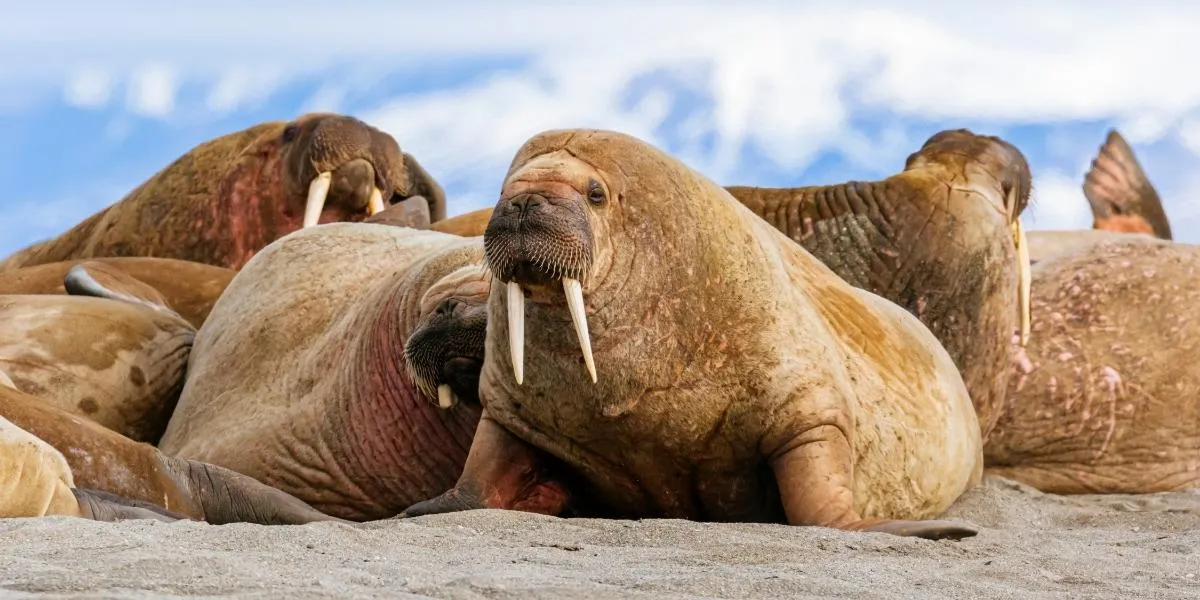Walruses are impressive marine mammals which are iconic due to their large size and long tusks. These reasons also make people fearful of them. Although there are examples of fatal walrus encounters, just how dangerous are walruses?
Yes, walruses are dangerous marine mammals. They are dangerous to their prey and even to their predators. Walruses can use their tusks to defend themselves against polar bears, and can even damage vessels. Some walrus encounters end in the death of a human.
Keep on reading to find out more about the dangers of walrus encounters, but also about their temperament – you may be surprised.
Are Walruses Dangerous?
Yes, walruses can be dangerous to their prey, their predators and even their own species. Walruses are dangerous because they use their enlarged canine teeth (tusks) to defend themselves. Walruses are particularly dangerous if they are hunting, being hunted, mating, or defending themselves and their young1 (source: I. Charrier, et al, Mammalian Biology, Vol. 76, Issue 5, pp.622-627, 2011).
Walruses are known to attack various marine mammals including seals2 (source: F.H. Fay, Arctic, Vol. 13, No. 2, pp. 111-122, 1960). Walruses have also been recorded to kill humans and damage their vessels3 (sources: BBC Studios, Arctic Museum & Arctic Studies Centre, Bowdoin College, The Polar Bear Programme).
Do Walruses Attack Humans?
Yes, walruses can attack humans. Walruses are known to have attacked humans both at sea and on land. This has been documented by Inuit communities and explorers of the Arctic (typically Europeans)4 (source: Wikipedia). These walrus encounters can damage vessels and even end in human fatalities5 (source: D.B.MacMillan and W..E.Ekblaw, Four Years in the White North, 1918). Humans have also passed away after encountering walrus in captivity6 (source: Deccan Chronicle, 2016).
However, just because walruses can attack humans, this does mean that they actively seek to do so. Also, not every walrus attack leads to human casualties7 (source: B.Ferreira, Vice, 2019). Walruses do not hunt humans, and an example shows that when a human-walrus encounter was made, the walrus did not kill the human, and left holding a seal within its mouth8 (source: K. Hansen, Nuussuarmiut, 2008).
Are Walrus Aggressive?
Walruses have been described as fearless animals, that would put up a fight against any opponent9 (source: K. Hansen, Nuussuarmiut, 2008). However, in the presence of a polar bear – a natural predator – walruses have been observed to be anxious and frightened. This causes them to retreat into the safety of the sea, which opposes the idea of them being blindly aggressive10 (source: The Polar Bear Programme).
Male walruses can also be aggressive to other adult males if they compete for the same female during mating season. Walruses can display their aggression by making loud noises and showing their tusks. However, this does prevent fighting between males11 (source: B. Sjare and I. Stirling, Canadian Journal of Zoology, Vol 74, No 5, 1996, P. Knudtson, The World of the Walrus, 1998).
Are Walruses Territorial?
Yes, walruses can be territorial. This is particularly seen in adult male walruses12 (source: National Geographic). Walruses are marine mammals and this is a trait seen among other marine mammals, including most pinnipeds. Walruses are typically territorial against potential competitors or intruders.
Adult male walruses are also territorial during mating season. During this period, walruses are defensive over a specific small aquatic area, positioned around a herd of adult female walruses13 (source: I. Charrier, et al, Mammalian Biology, Vol. 76, Issue 5, pp.622-627, 2011).
Are Walrus Friendly?
Yes, walruses can also appear to be friendly. This is often observed in walruses which are kept in captivity. Further, walruses can be trained by specialists to be calm and relaxed in the close presence of humans14 (source: BBC Studios). However, it may be hard to find examples of a walrus running up to you with the friendliness of a Labrador.
Walruses are also relatively friendly to other walruses. For example, they can coexist in herds of thousands of walruses15 (source: The Polar Bear Programme). Whilst resting on land or sea ice, walruses can see this as an opportunity to socialise16 (source: WWF).
Our full article with facts about walruses explores other things you may not know about walruses, including how you can tell their age and what their mustache is for.
How Smart Are Walruses?
Walruses are intelligent marine mammals, which often dominate their food chain.
Walruses are smart in the sense they are adaptable to various scenarios, understand how to best protect their young, and importantly know when NOT to fight – despite being one of the largest marine mammals with enlarged canine teeth17 (source: I. Charrier, et al, Mammalian Biology, Vol. 76, Issue 5, pp.622-627, 2011). This highlights their emotional intelligence18 (source: The Polar Bear Programme).
They also have an impressive range of vocalisations with various purposes19 (source: I. Charrier, et al, Mammalian Biology, Vol. 76, Issue 5, pp.622-627, 2011). Walruses can be trained to make these noises on demand20 (source: BBC Studios).
Related Questions
Are Walruses Fast?
Although walruses are very large, they can move quite quickly in the water. Walruses can travel up to 21.7 miles per hour underwater. However, walruses swim at an average speed of 4.3 miles per hour21 (source: B.Ferreira, Vice, 2019). Walruses can also travel on land, however, are much slower22 (source: Seaworld).
Read more about how fast walruses are.
Can You Pet a Walrus?
Generally speaking, no, you should not pet a walrus. Walruses in the wild can get scared by the presence of humans – this can cause a stampede23 (source: The Center for Biological Diversity). However, senior marine mammal trainers have been able to train walruses. At certain zoos, the trainers can touch the walruses in return for food24 (source: BBC Studios).
Can A Walrus Kill a Polar Bear?
It is rare for a walrus to attack a polar bear although they may have to defend themselves since polar bears are the main predator of walruses. Walruses do have the potential to kill polar bears. There are examples of polar bears being observed with tusk marks. This is likely to occur if a polar bear has been unsuccessful in hunting a walrus25 (source: The Polar Bear Programme).
Are Walruses Dangerous To Whales?
Yes, both walruses are whales are dangerous to each other, to some extent. There have been observations of orca whales hunting for walruses. Walruses are dangerous to whales in a similar way to how they are dangerous to polar bears.
This means that walruses generally leave whales alone, however, if they are provoked then walruses will flee or defend themselves using their tusks26 (sources: The Polar Bear Programme, N. V. Kryukova, et al, Biology Bulletin, Vol. 39, pp.768–778, 2012).
Do Walruses Have Predators?
Yes, walruses have predators. Two of its biggest predators are polar bears and humans. Polar bears typically hunt young or injured walruses for food27 (source: BBC Studios). Humans traditionally hunt walruses for blubber, hide, and tusks28 (source: Arctic Museum & Arctic Studies Centre, Bowdoin College). Another predator of walruses is orca whales29 (source: N. V. Kryukova, et al, Biology Bulletin, Vol. 39, pp.768–778, 2012).




![Read more about the article 16 Tusk-Worthy Facts about Walruses [#7 Will Shock You]](https://polarguidebook.com/wp-content/uploads/2022/09/Walrus-300x200.jpg)
